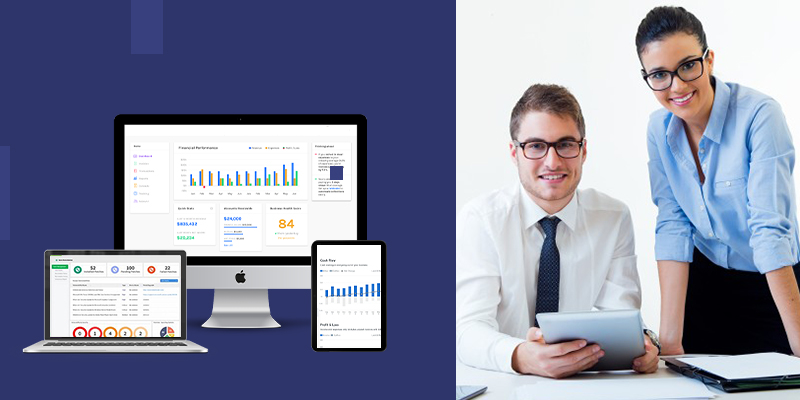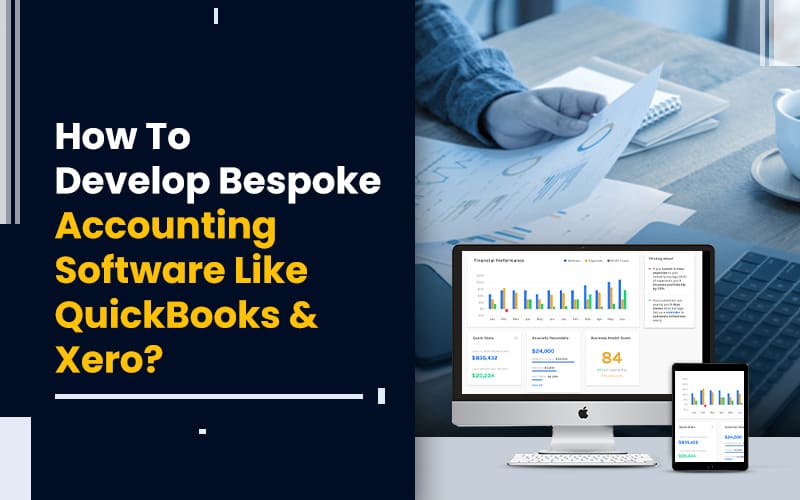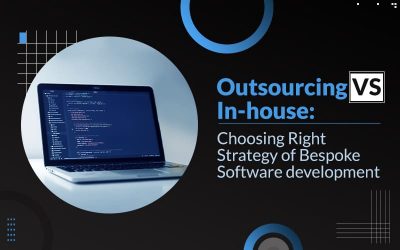How to Develop Bespoke Accounting Software like QuickBooks and Xero?
Regularly, all forms of monetary operations must be handled by organizations of all sizes. Nothing compares to the annoyance of making incomprehensible transactions, receipts, and accounts receivable due to a lack of a structured functioning procedure throughout the workplace. Owing to minor accounting discrepancies like overcharging sales taxes, businesses that are actively involved in the industry are confronted with massive fines and over-the-top interests. For this reason, accounting software development has now become essential for businesses to handle their accounting and record-keeping activities effectively.
Synchronously, it reduces capital spending, assists in strategic decisions, and aids in the discovery of new business opportunities. As a result, selecting the best accounting solution that suits your budget and meets the key business requirements is important.
Do you want to improve the efficiency of your business? If that’s the case, you’ll need to invest in accounting software development that’s both reliable and user-friendly. Financial transfers, cash flow monitoring, tax calculation, bookkeeping, market analysis, and reporting are only a few of the operations that can be streamlined with bespoke accounting software. But, how do you develop bespoke accounting software like Quickbooks or Xero? Please continue reading to find out more.
QuickBooks and Xero are accounting software applications that combine specialized accounting, bookkeeping, and financial reporting software resources. Furthermore, it ensures a smooth cash flow while also simplifying monitoring, recording, and a variety of CRM activities. Let’s take a deeper look at the advantages of accounting software development for businesses. Simultaneously, we’ll look at the main features that make QuickBooks and Xero such good accounting software for businesses.
But, before discussing about the benefits of accounting software development, let’s discuss,
What are Accounting Software Solutions?
Accounting software aids companies of all sizes in streamlining and automating financial reporting procedures, maintaining detailed records, and improving operating performance through simple repetitive processes, including invoicing, balance sheets, reconciliation, accounts payable, and accounts receivables.
Profits, expenditures, transactions, sales, stock, order processing, contacts, supplier records, records, bills, transactions, and receipts can all be tracked and managed with bespoke accounting software. They also make it easier for users to collaborate.
But,
Who needs Accounting Software?
Accounting software can be used by businesses of all types that have an accounting or finance department. Accounting software is available in a variety of sizes and forms, with options for small enterprises, large corporations, and nonprofit organizations.
Business accounting software can assist in lowering human resource costs and increasing overall efficiency. In order to grow into mid-size and large businesses, startups incorporate accounting systems to increase profitability. Besides, several enterprise-sized corporate accounting tasks, such as invoicing, evaluation and reporting, and monitoring, are automated and consolidated with enterprise accounting software, combined with ERP software.
Considering the unique aspect of accounting, determining the right software for a specific company can be difficult. This is due to the fact that they are not all created equal since they have a variety of different features, payment options, amount of usage, and other differences. To ease out things, let’s discuss,
Types of Accounting Software
As the software development market progresses, so does the array of accounting software solutions available to companies looking to boost the productivity of their accounting departments and the overall quality of their activities.
Matellio conducted a quick analysis to determine the various types of accounting software. Our report’s findings are listed below. Take a look!
- SpreadSheets – Spreadsheet applications such as Google Sheets, Microsoft Excel, or Open Office can be used by small companies with simple accounting tasks. One of its reasons they’re ideally suited for this sector is that they can handle simple accounting activities like listing revenue and expenditures, as well as more complex accounting functions. Regardless, they are free to use and need little or no practice.
- Commercial Accounting Software – Small and medium-sized businesses use them because they can provide them with most, but not all, of their accounting requirements. Accounting professionals may use commercial software to draft and send tax reports, monitor changes in relevant legislation, and perhaps even keep a close eye on auditing. These include Xero and QuickBooks like accounting software.
- Enterprise Accounting Software – Large companies and multinational companies use this category of accounting software. Enterprise accounting software often integrates with many other services such as workflow management and operational planning, in addition to assisting with dynamic accounting practices.
- Custom accounting software – Accounting software for large corporations and accounting software for small businesses are examples of custom accounting software solutions. These solutions only provide the features required for a business to keep track of its financial health and deal with all accounting-related issues, such as taxes, payments, credits, and so forth.
Moving on,
How can accounting software development make the accounting process of a business easier?
An individual’s physical appearance will reveal a lot about what they’re on the inside. The same can be said for every company’s back-office operations. Accounting practices that are in good shape improve the company’s reputation in the eyes of customers and prospective investors. So, if you’ve been debating whether or not to invest in accounting software development, here some of the aspects it can support you in streamlining your accounting procedures and boost revenues.
Benefits of Bespoke Accounting Software Development
- It’s built to be user-friendly
- Assist in the reduction of repetitive tasks
- Invoices and quotations can be sent to customers easily
- Standardized bank feeds
- Add-ons allow you to personalize your experience
- It supports multiple currencies
Since we discussed a lot about accounting software, let’s take a peek at some of the most important features of accounting software development.
Recommended Read : What Are The Top Benefits Of Bespoke Software Development?
What are the top essential features of QuickBooks and Xero accounting software?
 After presenting you the benefits of accounting software development, it’s time to question which functionality is more or less needed for strong financial accounting software.
After presenting you the benefits of accounting software development, it’s time to question which functionality is more or less needed for strong financial accounting software.
- Currency Convertor – One of the most important selling points for a company that wants to expand globally is the ability to convert currencies quickly. There’s no need to think about manually converting any of the currencies because there’s a built-in automatic converter. As a result, if a business enters a bill in Australian Dollars, it will be immediately converted to US Dollars.
- Analytics & Reporting – Advanced analysis and prediction capabilities are needed in robust accounting software. These features are used to visualize a company’s past success and predict its potential performance. This can be done with a variety of maps, graphs, and patterns, among other things.
- Reconciliation – Transactions are extracted from data sources, and the bulk of them are reconciled using automatic matching functionality. This involves user-defined matching and grouping rules that help minimize the amount of time it takes to create correct reconciliations.
- Cash Flow Management – Businesses use cash flow management to capture, control, and use cash. This element could also be used to monitor the company’s financial position because cash management does not only apply to cash but also to any resources that could be quickly transformed into cash.
- Dashboard – Dashboards are real-time user interfaces that display a graphical summary of the actual status and historical patterns of a firm’s key performance indicators (KPIs) to allow for quick and knowledgeable decisions.
- Financial Management – Accounting software is a powerful tool for financial management that allows businesses to have more control over their finances while still increasing security. Furthermore, it streamlines key accounting functions, allowing businesses to efficiently handle their finances with less manual effort.
- Billing & Invoicing – Accountants can issue receipts and monitor payments more easily with automation systems. As a result, businesses have more leverage over incoming payments. Accounting software may also submit alerts to counterparties, advising them to make a payment. Custom accounting software generates invoices that are tailored to each company’s unique needs.
- Payroll Management – One of the most significant features of accounting software is payroll management. It calculates salaries, reimbursements, incentives, and paid time off by automating complex operations. Simultaneously, it handles vital activities such as wage deductions, record keeping, and tax deposition/reporting, among many others.
Well, there are so many features of accounting software. If you want an in-depth quotation of basic and advanced features, you can contact us.
Moving on, to get it to the final result stage, every development process progresses through many phases. Bespoke accounting software should be designed around the company’s needs, beginning with the most basic features and expanding as needed. Let’s take a closer look at how to develop bespoke accounting software.
Key steps to follow for accounting software development
Here are vital steps to follow for successful accounting software development. Take a look!
1. Research and Analyze the Market
So, you’ve come up with a brilliant business idea of developing accounting software? Superb! The decision-making is the initial thought. The abstract definition, however, will not be sufficient to kickstart the project entirely. A solid foundation and research note are required for bespoke accounting software development. Further analysis of the business structure will show its flaws and include suggestions for improving and customizing it.
2. Create Mockups
So you’ve got a rough idea of what your custom accounting solution might look like. However, before you begin development for your accounting software, you must first create a product design. You build a model of a potential product here, test the concepts you’re coming up with, and determine how efficiently they can solve existing issues. This stage necessitates close collaboration between the client and the engineering team. The latter must depend on the former’s input on the software development, make suggestions, and convey expectations. The development team not only comes up with ideas but also makes deals with the production plan by changing the design
3. Start the Development
This step will undoubtedly take a long time to accomplish. Don’t rush; it’s in your best interests to complete the project as quickly as possible. This is the most critical factor for project success. The implementation of a functional version of accounting software is the first step for development teams.
For developing the accounting software, you’ll require a development team of the following roles:
- Frontend developer
- Backend developer
- Business analyst
- QA engineer
- Project manager
- UI/UX designer
Besides, the most bespoke developer now use the DevOps concept, which entails continuous integration, monitoring, and execution, in line with current trends. This means that the application is developed in stages, starting with the most significant characteristics. The final product is often well-designed and thoroughly tested due to this approach, allowing a customer to quickly adapt it and achieve a specific competitive advantage in the marketplace.
4. Test the Software
It is preferable to double-check than to make a mistake. Of course, the task will never be completed. It is a continuous process that necessitates periodic updates and upgrades. Before finally completing the production, it’s good to start beta-testing to see how well the interface is thought out and correct any bugs that might arise.
Moving on,
How much does Bespoke Accounting Software Development Costs?
The cost of custom software development is determined by a number of aspects. In the context of bespoke accounting software, the cost of implementation is determined by the number of features and tools required; the more facilities and tools you require, the more resources you will have to spend. Another price differential is the processing time; the longer it takes, the more expensive it is. Finally, since it is the most important factor in the cost of accounting software development, the cost will be determined by the professionals you hire to build your bespoke accounting software.
Matellio’s Experience in Accounting Software Development
Matellio’s custom accounting software development services are the remedy. Matellio specializes in developing custom accounting applications. It can use diverse methodologies, structures, and industry accelerators to help the business generate revenue.
Long story short, our web development experience has been adequately inspected. Matellio has created accounting applications for small businesses as well as enterprise-level complex accounting solutions. Startups and businesses are also among our clients. We use software development methodologies and methods that have been thoroughly checked and are widely recognized worldwide. Matellio can handle any size accounting software development project for both web-based and mobile apps.
Conclusion
Accounting is an essential component of every commercial enterprise. Manually managing the account details, on the other hand, is difficult, time-consuming, and vulnerable to irregularities. Custom accounting software is much more unique because it is created to address a company’s particular needs.
If you’ve been considering designing your new accounting software to improve your company’s productivity but aren’t sure where to begin, please contact us. We’ll be glad to assist you with all of the nuances of custom accounting software growth, as well as its advantages and drawbacks.







